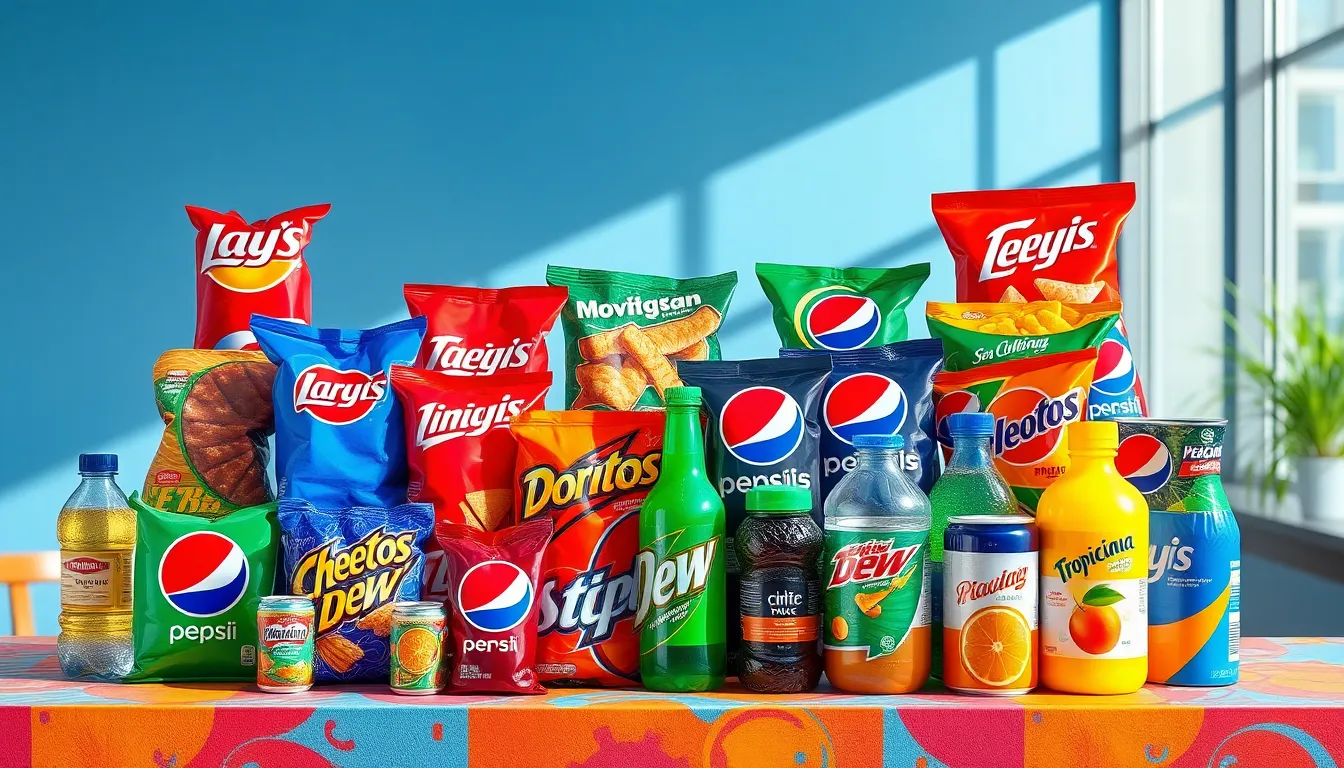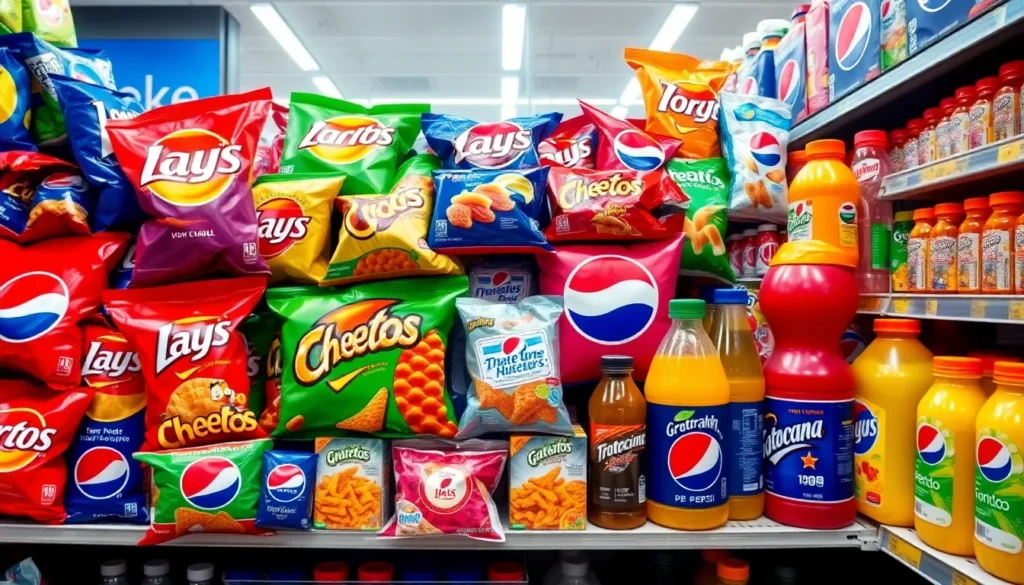Table of Contents
ToggleWhen you crack open a refreshing can of Pepsi, you might think you’re just enjoying a fizzy drink. But hold onto your soda! PepsiCo isn’t just about the cola; it’s a bubbling empire of brands that could make any snack lover’s head spin. From salty chips to sweet treats, PepsiCo has a finger in nearly every pie—or should we say, every bag of chips?
Overview of PepsiCo
PepsiCo represents a global leader in food and beverage manufacturing. Its portfolio features well-known brands that cater to various tastes and preferences. Not only does PepsiCo produce soft drinks like Pepsi, but it also offers an array of snacks and dairy products. For instance, brands such as Frito-Lay and Quaker Oats contribute significantly to its market presence.
Nutrition forms a key part of this expansive portfolio as well. Gatorade delivers sports drinks to athletes and active individuals. Tropicana provides fruit juices, appealing to health-conscious consumers seeking refreshing options. The company actively enhances its product lines to meet evolving consumer demands.
Snack foods play a crucial role in PepsiCo’s strategy. Lay’s, Doritos, and Cheetos represent iconic brands within the snack category. These offerings extend beyond traditional chips into healthier options, including baked varieties and organic snacks. Through innovation and marketing, PepsiCo effectively dominates both beverage and snack segments.
PepsiCo’s global reach ensures its products are available in over 200 countries. This extensive distribution network strengthens brand recognition worldwide. By focusing on sustainability initiatives, PepsiCo aims to address environmental concerns while maintaining its competitive edge.
Diversity remains a hallmark of PepsiCo’s brand strategy. The inclusion of various product lines enables the company to appeal to broad demographics. As consumer preferences shift, PepsiCo adapts, ensuring brand loyalty and sustained growth.
Major Brands Owned by PepsiCo

PepsiCo boasts an extensive portfolio that includes an impressive array of brands across various categories. This section details major brands grouped by type, showcasing the company’s versatility.
Snack Brands
Frito-Lay ranks as a leading division of PepsiCo, featuring popular snack brands. Lay’s, with its diverse chip flavors, appeals to many consumers. Doritos offers a bold crunch that has become a staple at parties. Cheetos, known for its cheesy taste, attracts both kids and adults. Other notable snacks include Ruffles, Tostitos, and Sun Chips, which cater to different preferences. PepsiCo’s snacks dominate shelves worldwide, reinforcing its strong position in the snack industry.
Beverage Brands
Pepsi serves as a flagship soft drink brand for the company. Mountain Dew features a citrus flavor that remains popular among younger consumers. Aquafina provides bottled water, addressing the increasing demand for hydration. Gatorade, with its electrolyte-rich formula, stands out in the sports drink category. Tropicana offers a range of juices, appealing to health-conscious individuals. Manufacturing a variety of beverages helps PepsiCo meet diverse consumer needs across the global market.
Health and Wellness Brands
Quaker Oats represents a cornerstone of PepsiCo’s health-focused offerings. This brand includes oatmeal, snack bars, and other wholesome products that encourage healthy eating. Naked Juice provides cold-pressed juices, appealing to those seeking nutritious options. Sabra, a leading hummus brand, offers healthy dips that complement modern snacking habits. Additionally, the company prioritizes expanding its portfolio with low-calorie and organic alternatives. This strategy supports consumers looking for healthier choices while enhancing brand loyalty.
Recent Acquisitions
PepsiCo continues to expand its influence within the food and beverage industry through strategic acquisitions. These recent moves enhance the company’s brand diversity and market reach.
Notable Brands Acquired
Bubly, an innovative sparkling water brand, stands out among PepsiCo’s acquisitions. The company added it to its portfolio to tap into the growing demand for healthier beverage options. Additionally, the acquisition of Rockstar Energy in 2020 strengthened PepsiCo’s position in the energy drink market. Other notable acquisitions include the purchase of Bare Foods, known for its healthy snacks, emphasizing PepsiCo’s commitment to health-conscious consumers.
Impact on PepsiCo’s Portfolio
Recent acquisitions significantly reshape PepsiCo’s product offerings. The inclusion of Budly and Rockstar Energy enhances the beverage segment, catering to consumers seeking refreshing alternatives. Bare Foods complements the snack category by introducing more nutritious options, appealing to health-oriented customers. Expanding its portfolio in this way allows PepsiCo to stay competitive and address changing consumer preferences effectively.
PepsiCo’s Competitive Landscape
PepsiCo faces stiff competition in the beverage and snack industries. Notable competitors such as Coca-Cola dominate the soft drink market, while companies like Mondelez International and Kraft Heinz challenge PepsiCo in snacks and food products. Market presence influences consumer preferences, with branded products positioned prominently on store shelves.
Diverse product offerings allow PepsiCo to cater to various demographic segments. Younger consumers often gravitate toward innovative brands like Bubly and Rockstar, emphasizing health and wellness trends. In contrast, established favorites such as Lay’s and Mountain Dew appeal to broader audiences.
Global reach enhances PepsiCo’s competitive edge. Over 200 countries feature PepsiCo products, boosting brand recognition while providing a significant advantage over regional competitors. Brand loyalty forms through consistent marketing strategies, endorsing well-known names like Tropicana and Cheetos.
Sustainability initiatives strengthen PepsiCo’s market position. Consumers increasingly favor brands that demonstrate environmental responsibility. To address this, PepsiCo implements eco-friendly packaging solutions and promotes nutritious snack options, resonating with health-conscious shoppers.
Recent acquisitions highlight PepsiCo’s strategy to expand its influence. The purchase of Bare Foods allows entry into the healthy snack sector. Such strategic moves reinforce PepsiCo’s ability to adapt to evolving consumer demands while maintaining its competitive stance.
Innovative marketing campaigns amplify PepsiCo’s visibility. Creative advertising across platforms engages different consumer groups, ensuring broad market outreach. This proactive approach to branding keeps PepsiCo relevant in both traditional and emerging markets.
PepsiCo’s extensive brand portfolio showcases its dominance in the food and beverage industry. With a diverse array of snacks and beverages that cater to various consumer preferences, the company remains a leader in the market. Its commitment to innovation and sustainability ensures that it not only meets current demands but also adapts to future trends.
As PepsiCo continues to expand its influence through strategic acquisitions and a focus on health-conscious options, its brands will likely maintain strong connections with consumers worldwide. The company’s ability to balance iconic favorites with emerging trends positions it for sustained success in an ever-evolving landscape.







